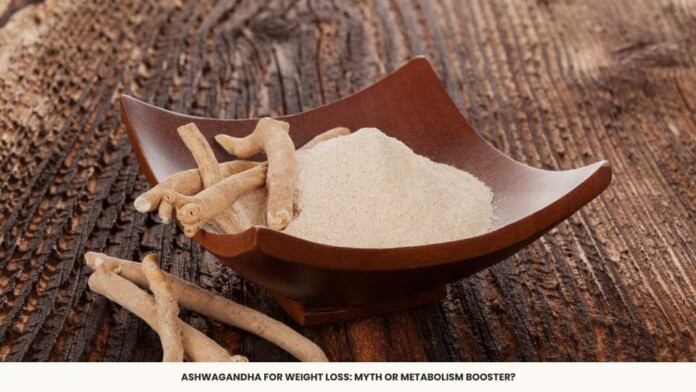Metabolic activities help your body by transforming the food you consume into energy, which is pivotal in determining whether you gain or lose body weight. It explains why your slow metabolism might be the hidden cause behind your sudden weight gain. It is important to have a faster metabolism, as it aids in burning a lot of calories even when you don’t exercise. If you are worried about the sluggish metabolism that cuts down your body’s energy expenditure, you can boost your metabolism rate with a simple supplement like Ashwagandha. But will this ancient herb help with weight loss, or is it just a common wellness myth? Let’s explore further.
What is Ashwagandha? A Quick Overview
Ashwagandha is popularly referred to as winter cherry, Indian Ginseng, or sleeping berry with Asian and African countries as its place of origin. This adaptogenic herb has been used by Ayurveda for more than 3000 years for improving energy levels and for stress relief [1]. The root of this mint-green plant is widely used for its medicinal value and people opine that it has a horse sweat-like odor. Regular consumption of Ashwagandha is believed to give you vitality and strength similar to a horse. It has an active component called withanolides, which can influence the way your body gains or loses weight.
Scientific Studies on Ashwagandha and Metabolism
Even though most of you might already know the goodness of Ashwagandha used in Ayurvedic formulations for several years, modern science has begun to explore the effect of this herb on weight loss and metabolism. The results of recent studies look promising and more research on Ashwagandha would be highly beneficial.
Effect on Cortisol Hormones
The result of the research was featured in the Indian Journal of Psychological Medicine in 2012. It showed that people who took 300 mg extract of Ashwagandha root two times per day helped cut down cortisol hormones and lowered stress levels. It also revealed that this herb will help reduce cortisol hormone levels, which can be triggered by stress. This hormone causes the accumulation of excess fat, specifically in the belly region.
Enhanced Insulin Sensitivity and Lipid Metabolism
Many studies have proved that consuming Ashwagandha extract might help in lowering glucose levels upon fasting and promote the body’s insulin sensitivity. These studies also showed that this potent herb will help in promoting metabolic syndrome by lowering the levels of LDL cholesterol as well as triglycerides.
Supports Thyroid and Improves BMR
According to the results in the Journal of Alternative and Complementary Medicine, a study held in 2018 had 50 hypothyroid participants. They were given Ashwagandha extract of 600 mg daily for a timeframe of 8 weeks. The study revealed that this herb helped in improving their thyroid levels – TSH or thyroid-stimulating hormone, T4 and T3. Once their thyroid function was improved, there was a significant improvement in their BMR or basal metabolic rate which helps in better calorie burning.
Builds Lean Muscles and Lowers Body Fat
A clinical trial held in 2015 and featured in the Journal of the International Society of Sports Nutrition was conducted with a group of healthy males who performed resistance training. They were administered a dose of Ashwagandha extract – 600 mg and reported better muscle strength and lean muscle growth with a lower amount of body fat than their placebo group counterparts.
How Ashwagandha May Help in Weight Loss
Ashwagandha is not a miracle fat-burning herb but it can induce weight loss indirectly by activating psychological as well as physiological mechanisms. Read on to learn how Ashwagandha might be beneficial for weight loss.
1. Keeps Your Stress and Cortisol Under Control
If you have chronic stress then it is natural for your body to experience a spike in cortisol levels. This stress hormone level can lead to insulin resistance, induce cravings, and cause excess abdominal fat leading to weight gain. Taking Ashwagandha regularly may help bring down your cortisol levels and keep your stress levels down [2]. Low cortisol helps you feel satiated with a low-calorie meal, which may help with weight loss.
2. Helps in Restorative Sleep
High-stress levels might lead to insomnia causing irregularities in your sleep pattern. Lack of sleep will cause fluctuations in hormones like leptin and ghrelin, which can cause unwanted hunger pangs with low levels of satiety. Supplementing your body with Ashwagandha will help lower anxiety and stress, which in turn, causes a decline in the levels of oxidative stress hormones while enhancing sleep quality [3]. The herb also promotes restorative sleep that exerts better control over your appetite and metabolic activities [4].
3. Increases Energy For Exercise Sessions
Ashwagandha helps you build lean muscles quickly while enhancing the resting metabolic rate to induce calorie burning even while you rest. It helps your workout sessions by improving recovery, gaining muscles, and reducing body fat while you are involved in resistance training [5]. The presence of alkaloids in Ashwagandha helps improve energy levels helping you perform exercises for longer periods [6].
4. Improves Serotonin Levels
Ashwagandha possesses adaptogenic properties that help your body combat the effects of stress. This medicinal herb can promote dopamine and serotonin levels, which can keep you free from stress and anxiety [7]. These happy hormones can prevent you from binge eating due to depression, which in turn helps with weight loss.
5. Improves Metabolic Activities and Aids in Weight Loss
Ashwagandha is loaded with antioxidant and anti-inflammatory properties, as it has withanolides [8]. It helps in kindling metabolism at the cellular level and lowers inflammation [9]. Cellular metabolism accelerates the rate of body fat-burning process, paving the way to weight loss. This herb also promotes blood circulation, which nourishes your skin cells and body waste will be flushed out regularly. The antioxidant effect of Ashwagandha prevents the damage caused by free radicals and prevents weight gain.
Ashwagandha Dosage and Best Time to Take It
- Ideal Dosage for Ashwagandha: For weight loss, the dosage tends to vary based on the specific body composition of each individual. The ideal dosage might be between 250 and 500 mg per day. You must take it regularly for at least a month to see its effectiveness.
- Best Time To Take Ashwagandha:
- Morning After Food: For lowering cortisol levels and stress for better productivity and clean eating.
- Night after Dinner: Helps enhance overnight recovery rate while sleeping and better sleep quality.
Myths About Ashwagandha and Fat Loss – What’s Not True
Ashwagandha has already earned recognition in the health and wellness industry. Though it possesses science-backed evidence for its role in weight loss, there are several myths that need to be addressed. They are:
Myth #1: Ashwagandha possesses self-fat melting properties.
The Truth: Ashwagandha, a herbal plant extract doesn’t trigger any direct fat-burning process. It does not perform calorie burning or induce thermogenesis like green tea or caffeine. It indirectly influences fat loss by accelerating muscle growth, improving sleep, and lowering stress.
Myth #2: You need not follow a diet or workouts when taking the Ashwagandha supplement.
The Truth: Any supplement like Ashwagandha cannot replace your physical workouts and calorie deficit diet to achieve weight loss. It performs a supportive supplement that can complement your weight loss diet and physical activities.
Myth #3: The higher the Ashwagandha consumption, the quicker would be your weight loss
The Truth: It is not advisable to consume a higher amount of Ashwagandha, as it will not help achieve the desired results. You might have to face serious side effects like an imbalance of hormones, drowsiness, gut issues, and more.
Myth #4: Ashwagandha helps in quick fat loss
The Truth: Ashwagandha can help your body achieve overall health by enhancing your sleep cycle, improving mood, and lowering stress. These activities might have a gradual effect on your body composition after a few weeks.
Myth #5: The effects of Ashwagandha are the same for all
The Truth: The effect that you might experience after taking Ashwagandha will be based on your sleep pattern, level of activity, hormone balance, and stress levels. People working in a stressful environment might experience quicker fat loss than the ones whose stress levels are under control.
Who Should and Shouldn’t Use Ashwagandha for Weight Management?
Though Ashwagandha can be beneficial for overall health, it is important to understand who must and must not use it for managing body weight.
Who Can Take Ashwagandha For Weight Management?
- Healthy people who wish to improve body composition and workout performance
- People with obesity driven by too much stress
- Those who wish to supplement Ashwagandha with a diet and workout regime
Who Must Avoid Taking Ashwagandha For Weight Management?
- Women who might be nursing newborns or pregnant
- People having autoimmune disorders
- People with a family history of liver conditions
- People taking medications for chronic issues
- Patients taking prostate cancer treatment
- Those having allergic reactions or reactions to herbs
The Verdict
Ashwagandha, the renowned herb can help you lose weight indirectly by keeping cortisol levels down and keeping you stress-free, which are responsible for triggering cravings and overeating. It also promotes metabolism and keeps you energized throughout the day. Though not a miracle weight loss herb, Ashwagandha can support your weight loss with a balanced diet coupled with workouts.
Citation Links
- Mukherjee PK, Banerjee S, Biswas S, Das B, Kar A, Katiyar CK. Withania somnifera (L.) Dunal – Modern perspectives of an ancient Rasayana from Ayurveda. J Ethnopharmacol. 2021 Jan 10;264:113157. doi: 10.1016/j.jep.2020.113157. Epub 2020 Aug 9. PMID: 32783987. – https://pubmed.ncbi.nlm.nih.gov/32783987/
- Della Porta M, Maier JA, Cazzola R. Effects of Withania somnifera on Cortisol Levels in Stressed Human Subjects: A Systematic Review. Nutrients. 2023 Dec 5;15(24):5015. doi: 10.3390/nu15245015. PMID: 38140274; PMCID: PMC10745833. – https://pubmed.ncbi.nlm.nih.gov/38140274/
- Salve J, Pate S, Debnath K, Langade D. Adaptogenic and Anxiolytic Effects of Ashwagandha Root Extract in Healthy Adults: A Double-blind, Randomized, Placebo-controlled Clinical Study. Cureus. 2019 Dec 25;11(12):e6466. doi: 10.7759/cureus.6466. PMID: 32021735; PMCID: PMC6979308. – https://pmc.ncbi.nlm.nih.gov/articles/PMC6979308/
- Tandon N, Yadav SS. Safety and clinical effectiveness of Withania Somnifera (Linn.) Dunal root in human ailments. J Ethnopharmacol. 2020 Jun 12;255:112768. doi: 10.1016/j.jep.2020.112768. Epub 2020 Mar 19. PMID: 32201301. – https://pubmed.ncbi.nlm.nih.gov/32201301/
- Tiwari S, Gupta SK, Pathak AK. A double-blind, randomized, placebo-controlled trial on the effect of Ashwagandha (Withania somnifera dunal.) root extract in improving cardiorespiratory endurance and recovery in healthy athletic adults. J Ethnopharmacol. 2021 May 23;272:113929. doi: 10.1016/j.jep.2021.113929. Epub 2021 Feb 15. PMID: 33600918. – https://pubmed.ncbi.nlm.nih.gov/33600918/
- Mikulska P, Malinowska M, Ignacyk M, Szustowski P, Nowak J, Pesta K, Szeląg M, Szklanny D, Judasz E, Kaczmarek G, Ejiohuo OP, Paczkowska-Walendowska M, Gościniak A, Cielecka-Piontek J. Ashwagandha (Withania somnifera)-Current Research on the Health-Promoting Activities: A Narrative Review. Pharmaceutics. 2023 Mar 24;15(4):1057. doi: 10.3390/pharmaceutics15041057. PMID: 37111543; PMCID: PMC10147008. – https://pmc.ncbi.nlm.nih.gov/articles/
- Lopresti AL, Smith SJ, Malvi H, Kodgule R. An investigation into the stress-relieving and pharmacological actions of an ashwagandha (Withania somnifera) extract: A randomized, double-blind, placebo-controlled study. Medicine (Baltimore). 2019 Sep;98(37):e17186. doi: 10.1097/MD.0000000000017186. PMID: 31517876; PMCID: PMC6750292. – https://pmc.ncbi.nlm.nih.gov/articles/PMC6750292/
- Ashwagandha. LiverTox: Clinical and research information on drug-induced liver injury. Bethesda, MD: National Institute of Diabetes and Digestive and Kidney Diseases; 2019. Accessed at ncbi.nlm.nih.gov/books/NBK548536 on July 6, 2022 – https://www.nccih.nih.gov/health/ashwagandha
- Logie E, Vanden Berghe W. Tackling Chronic Inflammation with Withanolide Phytochemicals-A Withaferin a Perspective. Antioxidants (Basel). 2020 Nov 10;9(11):1107. doi: 10.3390/antiox9111107. PMID: 33182809; PMCID: PMC7696210. – https://pmc.ncbi.nlm.nih.gov/articles/PMC7696210/









